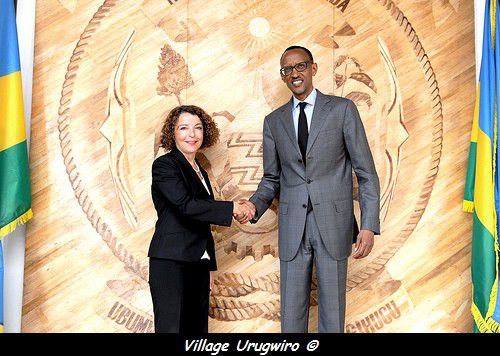Aid Suspension : What are consequences on the Rwandan Economy ? Read the interview of the IMF resident representative to Rwanda.
Mitra Farahbaksh with the Rwandan President Paul Kagame
25/02/2013
In 2012 several countries (UK, Nethderlands, Sweden and Germany*) but also the African Bank of Developement and the European Union, cut the aid to Rwanda, due to an United Nations report saying that Rwanda is supporting the M23 rebel group in the Kivu Region.
The aid represents about 40% of the Rwandan budget. Last week (HERE), the governement of Rwanda revised its 2013 budget. The Kenyan newspaper "The East African" has interviewed the IMF resident representative to Rwanda.
* : Germany resumed its aid this month : HERE
By John Gahamany
Rwanda’s domestic revenue is insufficient to fund government expenditure, meaning the country has to rely on donor aid. What measures are required to boost domestic revenue?
The government has to reduce its aid dependency through greater domestic resource mobilisation. At the request of the government, the Fund’s technical assistance mission visited Kigali late last year and made a number of recommendations for designing a medium-term strategy for significantly increasing the revenue-to-GDP ratio.
Specifically, it identified eight critical areas, where the focus must be to address weaknesses in tax policy and revenue administration.
These are improving taxpayer compliance, strengthening the tax policy unit, improving tax gap analysis, revising the investment code to reduce exemptions, complementing withholding taxes on dividends and interest by a capital gains tax at a similar rate; and reforming the VAT.
Specifically, when will these measures be implemented?
During the course of the next IMF mission to Kigali, in April, the Fund will discuss with the government the specific measures and the timing of their implementation as well as how much benefit each measure will yield in terms of increasing revenues.
Rwanda is keen to look for other means of financing; one of them is issuing a Eurobond. Given the current macroeconomic conditions, how would you gauge Rwanda’s ability to raise money in the international debt market?
Typically, investors will look at a number of factors when deciding to purchase sovereign bonds. They will consider a country’s macroeconomic situation, the level of a country’s debt and the ability of the country to pay its debt.
Rwanda’s macroeconomic conditions have been very good. The economy grew by 8.6 per cent in the first six months of last year. Inflation has been declining.
The macroeconomic outlook remains generally favourable. The country’s debt is about 21 per cent of GDP, which is reasonable. However, there is uncertainty about donor aid and how it is going to affect the economy and its macroeconomic position.
FULL INTERVIEW : THE EAST AFRICAN.CO.KE
A découvrir aussi
- Heavy rains at Kigali (Rwanda) kills 5 people and destroys 270 houses
- Fitch Ratings talks about the aid cut to Rwanda
- French students want to develop sport in Gahanga (Rwanda)

